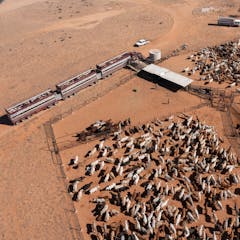
Articles on Bioethics
Displaying 1 - 20 of 119 articles

Brain-computer interface devices have the potential to boost users’ autonomy, especially for people who experience paralysis. But that comes with risks, as well.

The technology may be here sooner than we think. But we have so much to discuss first.

Vaccine policies fall on a spectrum, from mandates to recommendations. Deciding what to use and when is not so much a science but a balancing act between personal autonomy and public good.

The settlement is a long-awaited moment of victory for Henrietta Lacks and her family. But the battle for justice in genetic and medical research is not over yet.

Scientists can create viable eggs from two male mice. In the wake of CRISPR controversies and restrictive abortion laws, two experts start a dialogue on ethical research in reproductive biology.

The decision-making capacity of people under 18 would be assessed on a case-by-case basis by medical practitioners.

Biobanks collect and store large amounts of data that researchers use to conduct a wide range of studies. Making sure participants understand what they’re getting into can help build trust in science.

Hospital ethics committees and consultants do not make decisions for others, but their input can help support doctors and patients navigate difficult dilemmas.

We should think carefully about whether it is ethical to create living human-like beings only to conduct research on them.

When Peter Singer first published Animal Liberation in 1975, he wasn’t aware of climate change. But the new book, Animal Liberation Now, argues eating plants will reduce greenhouse gas emissions.

In April, scientists implanted synthetic monkey embryos in female monkeys. While none of them developed into fetuses, this is a new development that raises important ethical questions.

Two conservation scholars break down what de-extinction looks like – and the debate over whether it could do any good.

Early adopters have started using ChatGPT to assist with mundane tasks like writing sick certificates and patient letters.

Looking at the underlying philosophical and moral questions involved in abortion debates can help explain why it’s such an intensely divisive issue.

Scientific and public uproar resulted when the Chinese scientist announced the births of the first human babies with heritable edits to their genes. A new documentary reexamines the saga.

From warfare to entertainment and VR, brain-computer interface development has extended beyond prosthetics for patients with disabilities. Missing is full ethical consideration of the consequences.

A new biotech partnership could bring the first baby thylacine to life within 10 years. But de-extinction is controversial – should we even be doing this?

In a huge milestone, researchers have grown a mouse embryo entirely from stem cells. Could humans be next?

China’s industrial-scale organ trafficking practice has been executing prisoners of conscience and using their organs for transplantation for decades. This is known as forced organ harvesting.

Both Macron and Madonna have expressed concerns about genetic privacy. As DNA collection and sequencing becomes increasingly commonplace, what may seem paranoid may instead be prescient.
